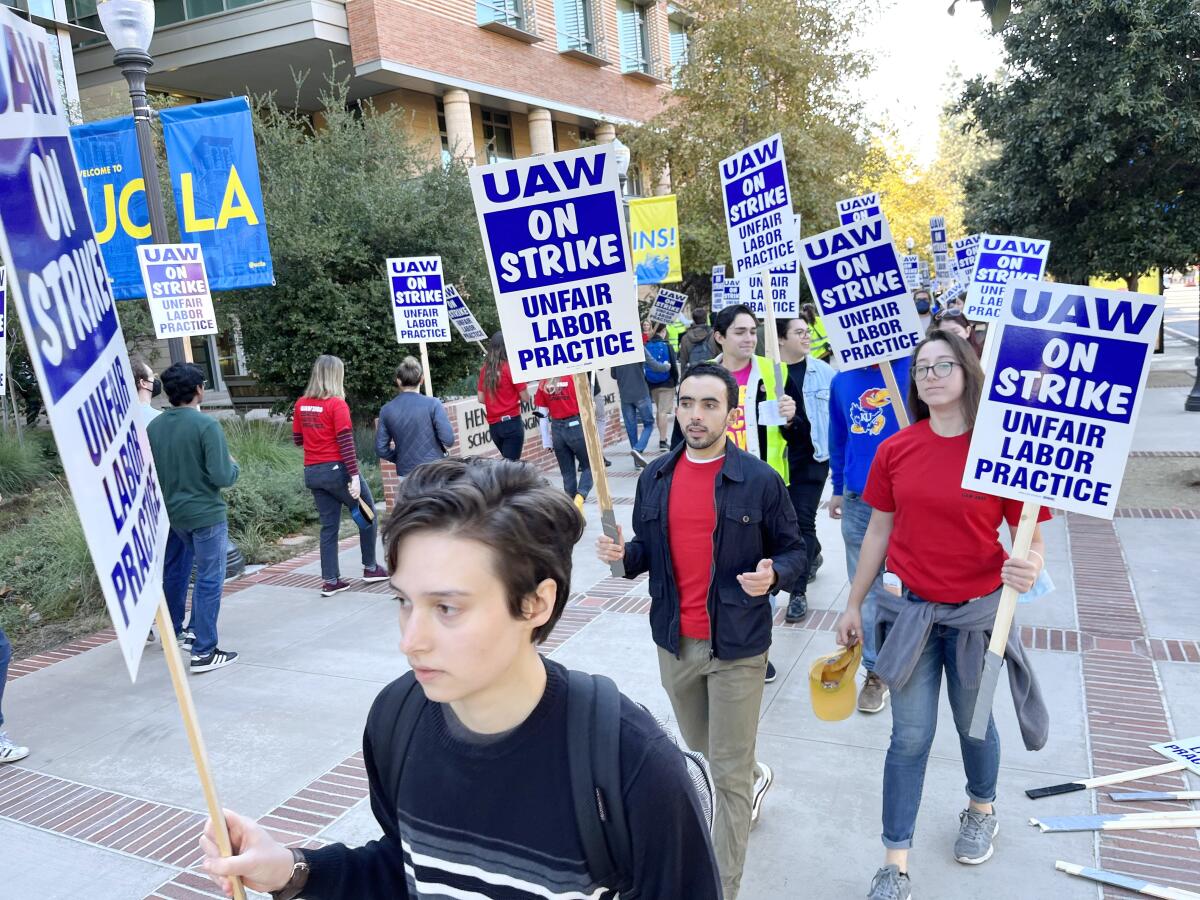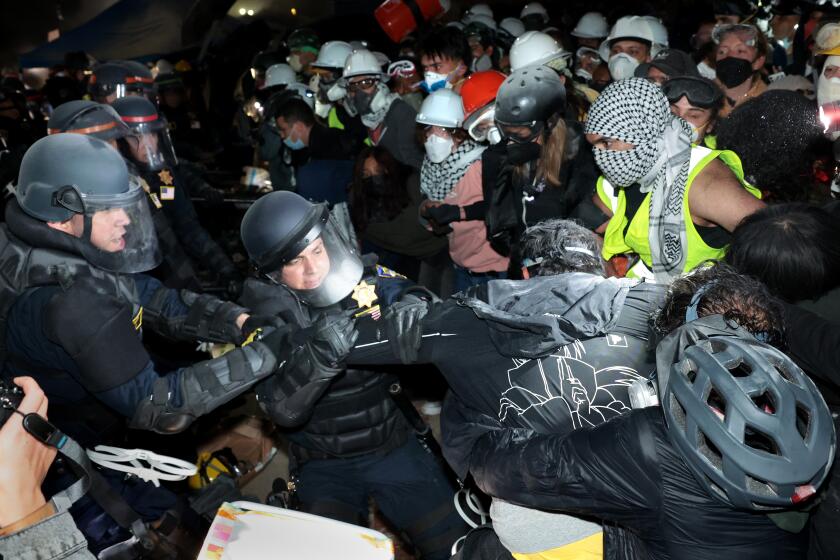‘Maximize chaos.’ UC academic workers authorize strike, alleging rights violated during protests

and Suhauna Hussain
May 15, 2024 7:40 PM PT
The union representing 48,000 graduate student teaching assistants, researchers and other student workers across the University of California’s 10 campuses has voted to authorize a strike and “maximize chaos,” alleging that its workers’ rights have been violated at several universities by actions against pro-Palestinian protests, union leaders announced Wednesday evening.
The walkouts, which are still being planned, were approved by 79% of the 19,780 members of the United Auto Workers Local 4811 who voted. The strike vote comes as campuses throughout the UC system have been roiled by tensions and protests over the Israel-Hamas war, including a violent mob attack on a pro-Palestinian encampment at UCLA.
Though the vote gives the union permission to strike as soon as Wednesday night, it was unclear when or where the walkouts would occur. The union represents teaching assistants, tutors, researchers and postdoctoral scholars.
The union rebuked UCLA, UC San Diego and UC Irvine for crackdowns on pro-Palestinian student protesters. On Wednesday evening, scores of police officers in riot gear were moving on pro-Palestinian demonstrators at UCI who occupied and barricaded the Physical Sciences Lecture Hall.
Rafael Jaime, the union’s co-president and a PhD candidate in UCLA’s English department, said the goal would be to “maximize chaos and confusion” at universities where the union alleges officials have violated workers’ rights over workplace conditions during student protests against the Israel-Hamas war.
“Our members have been beaten, concussed, pepper sprayed, both by counter-protesters and by police forces. As a union, it is our responsibility to stand beside them,” the union said in a statement. “In order to de-escalate the situation, UC must substantively engage with the concerns raised by the protesters — which focus on UC’s investments in companies and industries profiting off of the suffering in Gaza.”
In a letter sent to graduate student workers on Wednesday, the University of California warned students against striking.
“The University’s position is that the Union’s strike is unlawful, and as a result, a work stoppage is not protected strike activity. This means that participating in the strike does not change, excuse, or modify, an employee’s normal work duties or expectations. And, unlike a protected strike, you could be subject to corrective action for failing to perform your duties,” the unsigned letter from the office of the president said.
The academic worker strike would be modeled after last year’s “stand up” strikes against Ford, Stellantis and General Motors and similar to recent strikes at Southern California hotels. The walkouts would not target all campuses at once, Jaime said, but one by one based on how receptive administrations are to pro-Palestinian activists.
UC Riverside and UC Berkeley have reached agreements with protesters to end encampments and explore divestment from weapons companies. Leaders at those universities have rejected calls to target Israel specifically or for academic boycotts against exchange programs and partnerships with Israeli universities.
While some Jewish students have supported pro-Palestinian protests, national Jewish groups have criticized the divestment push, saying it is antisemitic because it aims to delegitimize the only predominantly Jewish nation.
Union members began casting their ballots online Monday. The strikes, Jaime said, could run for any length of time through the end of June. The period covers a critical moment on campuses during finals and commencement exercises.
In November and December 2022, the union walked our for six weeks, winning significant improvements in wages and working conditions and energizing a surge of union activism among academic workers across the nation.
Before the strike vote results came out, the University of California said the union was inappropriately flexing its muscle on a political issue.

UCLA chancellor faces growing faculty criticism, no-confidence vote, after weeks of turmoil
May 11, 2024
“UC believes that the vote currently being conducted by UAW leadership sets a dangerous precedent that would introduce non-labor issues into labor agreements,” said Heather Hansen, spokesperson for the UC office of the president.
The disagreement hinges on whether student workers such as Jaime, who was part of pro-Palestinian protests at UCLA the night a violent mob attacked the encampment, are striking over a “workplace issue or political speech,” said John Logan, a professor in the department of labor and employment studies at San Francisco State University.
“The contract between UAW and UC does include language on academic freedom, but the university could say, ‘Yes, speech is protected, but the actions you engaged in go far beyond speech, preventing students from getting into [a] library or other campus [areas] that are not protected,’” Logan said.
Another challenge was turnout. Pro-Palestinian activism has touched every UC campus, but it has been stronger at those in or near big cities. A union referendum last year in support of a permanent cease-fire in the Israel-Hamas war and divestment passed by 90%, but received fewer than 6,000 total votes. The most recent contract ratification had more than 36,000 votes. Turnout for the strike vote was high but less than the contract ratification.
As college presidents across the country have faced criticism for calling in police in riot gear to clear pro-Palestinian encampments, the move to threaten a strike is one of the biggest actions by an American labor union in support of Palestinians.
The vote came after the union filed charges with the state labor board over arrests of pro-Palestinian graduate student protesters at UCLA and suspensions and other discipline at UC San Diego and UC Irvine, accusing the universities of retaliating against student workers and unlawfully changing workplace policies to suppress pro-Palestinian speech.
The universities have broadly said they were attempting to ensure safe campus environments while respecting free speech rights. Internal and external investigations are underway at UCLA.
Some members said they believed the union’s criticism of the campus protest crackdown did not go far enough. Many student protesters have called for campus police to be defunded or for universities to vow to never again call municipal police to campus. The union did not include those in its strike-related demands.
“It’s really disappointing to me as a Black person that the union did not take a strong stance on policing and racial profiling on campus,” said Gene McAdoo, a doctoral student in the UCLA School of Education and Information Studies. “They portray themselves as radical, yet aren’t on this issue.”
McAdoo still voted in support, he said, because “withholding our labor gives us a lot of power and leverage to push the UC administration to meet [Students for Justice in Palestine] demands for divestment. That is the ultimate goal of this movement. But I also know that there is an undercurrent of folks who are still pushing for cops off campus.”
It’s not the first time UAW workers have pushed for divestment. In 1973, Arab American workers in Detroit auto plants walked off the job in protest of the union’s investment in Israeli bonds.
But for a union to vote on a strike while a contract is in place is “unheard of in modern times,” said Jeff Schuhrke, a labor historian who teaches at SUNY Empire State University.
While the union demands on academic freedom, free speech and protection from violence could arguably center on workplace conditions, they also explicitly support protesters’ calls for divestment from weapons manufacturers and other companies profiting from Israel’s war in Gaza.
The strike vote “is not about economics. It’s not about a raise, or more benefits. It’s political,” Schuhrke said.
The professor said that harked back to the origins of the student labor movement, when the first graduate unions formed in the 1960s during the campus free speech and antiwar movements.
AFT Local 1570, a union of teaching assistants formed at UC Berkeley in the throes of the campus free speech movement, voted in 1966 to strike against the University of California in response to police arresting students conducting a sit-in around a U.S. Navy recruitment table on campus.
The Teaching Assistants’ Assn. at University of Wisconsin-Madison, which grew out of the anti-draft sit-in and campus demonstrations against Dow Chemical for its role in production of napalm and other weapons for the Vietnam War, is the oldest graduate union still in existence in the U.S.
“The graduate union movement is coming full circle,” Schuhrke said.
More to Read
 UC rejects calls for Israel-related divestment, boycott driving pro-Palestinian protests April 27, 2024
UC rejects calls for Israel-related divestment, boycott driving pro-Palestinian protests April 27, 2024 At USC, arrests. At UCLA, hands off. Why pro-Palestinian protests have not blown up on UC campuses April 26, 2024
At USC, arrests. At UCLA, hands off. Why pro-Palestinian protests have not blown up on UC campuses April 26, 2024 Photos: Tensions grow as pro-Palestinian demonstrations on college campuses continue May 1, 2024
Photos: Tensions grow as pro-Palestinian demonstrations on college campuses continue May 1, 2024
CALIFORNIAEDUCATIONJOBS, LABOR & WORKPLACEISRAEL-HAMAS

Jaweed Kaleem is a national correspondent at the Los Angeles Times. Based in L.A. with a focus on issues outside of California, he has traveled to dozens of states to cover news and deeply reported features on the complexity of the American experience. His articles frequently explore race, religion, politics, social debates and polarized society. Kaleem was previously based in London, where he was a lead news writer on Russia’s war on Ukraine and spearheaded European coverage for the Times, including the Global California initiative. Before joining The Times in 2016, he reported on religion for HuffPost and the Miami Herald, where he was a member of a Pulitzer Prize finalist team recognized for coverage of Haiti. His reporting has also received awards from the Society of Professional Journalists, the Society for Features Journalism, the Asian American Journalists Assn., the South Asian Journalists Assn. and the National Headliner Awards.

Suhauna Hussain is a business reporter covering California labor and workplace issues for the Los Angeles Times.



